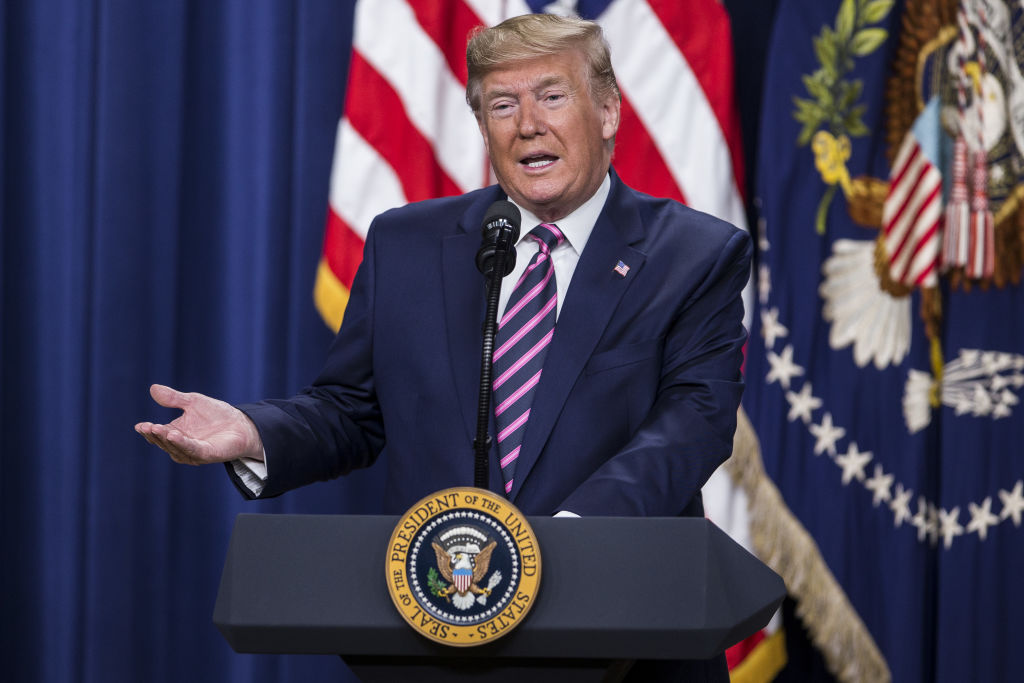
President Donald Trump signed off on a so-called phase-one trade deal with China, averting the Dec. 15 introduction of a new wave of U.S. tariffs on about $160 billion of consumer goods from the Asian nation, according to people familiar with the matter.
The deal presented to Trump by trade advisers Thursday included a promise by the Chinese to buy more U.S. agricultural goods, according to the people. Officials also discussed possible reductions of existing duties on Chinese products, they said. The terms have been agreed but the legal text has not yet been finalized, the people said. A White House spokesperson declined to comment.
The administration has reached out to allies on Capitol Hill and in the business community to issue statements of support once the announcement is made, they said.
U.S. stocks rose to records earlier Thursday as optimism grew that there would be a deal. Trump tweeted that the U.S. and China are “VERY close” to signing a “BIG” trade deal, also sending equities higher.
“They want it, and so do we!” he tweeted five minutes after equity markets opened in New York, sending stocks to new records.
Getting VERY close to a BIG DEAL with China. They want it, and so do we!
— Donald J. Trump (@realDonaldTrump) December 12, 2019
Trump has rejected deals with China before. Negotiators have been working on the terms of the phase-one deal for months after the president announced in October that the two nations had reached an agreement that could be put on paper within weeks.
The U.S. has added a 25% duty on about $250 billion of Chinese products and a 15% levy on another $110 billion of its imports over the course of a roughly 20-month trade war. Discussions now are focused on reducing those rates by as much as half, as part of the interim agreement Trump announced almost nine weeks ago.
In addition to a significant increase in Chinese agricultural purchases in exchange for tariff relief, officials have also said a phase-one pact would include Chinese commitments to do more to stop intellectual-property theft and an agreement by both sides not to manipulate their currencies.
Put off for later discussions are knotty issues such as longstanding U.S. complaints over the vast web of subsidies ranging from cheap electricity to low-cost loans that China has used to build its industrial might.
Officials from the world’s two biggest economies have been locked in negotiations on the phase-one deal since Trump announced it.
The new duties, which were scheduled to take effect at 12:01 a.m. Washington time on Sunday unless the administration says otherwise, would hit consumer goods from China including smartphones and toys.
Before today, Trump’s advisers have sent conflicting signals and stressed that he hadn’t made up his mind on the next steps. Advocates of delaying the tariff increase have argued that continued negotiations with Beijing will enable him to maintain a tough line with China without inflicting the economic damage that more import taxes might bring.
The decision facing Trump highlights one dilemma he confronts going into the 2020 election: Whether to bet on an escalation of hostilities with China and the tariffs he is so fond of or to follow the advice of more market-oriented advisers and business leaders who argue a pause in the escalation would help a slowing U.S. economy bounce back in an election year.
What Bloomberg’s Economists Say…
“The outcome of U.S.-China trade talks will be a key determinant of the trajectory for 2020 growth. At one extreme, a deal that takes tariffs back to May 2019 levels, and provides certainty that the truce will hold, could deliver a 0.6% boost to global GDP. At the other, a breakdown in talks would mean the trade drag extends into the year ahead.”
–Tom Orlik, chief economist
For the full report, click here
Robert Lighthizer, the U.S. trade representative leading the negotiations with China, is in a camp that sees progress in talks and wants them to continue without further escalation, according to people familiar with the discussions. That would set up a push to conclude the talks in January, possibly before a State of the Union address to Congress by Trump.
–– With assistance from Justin Sink, Vince Golle and Jennifer Jacobs.
More Must-Reads from TIME
- Cybersecurity Experts Are Sounding the Alarm on DOGE
- Meet the 2025 Women of the Year
- The Harsh Truth About Disability Inclusion
- Why Do More Young Adults Have Cancer?
- Colman Domingo Leads With Radical Love
- How to Get Better at Doing Things Alone
- Michelle Zauner Stares Down the Darkness
Contact us at letters@time.com